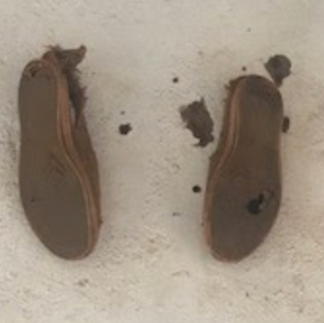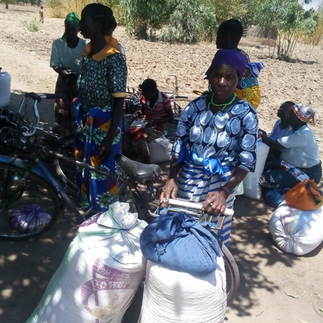Unfulfilled Potential
- EchoAfrica Team Blog 3
- Dec 5, 2017
- 5 min read
Today’s journey began with a fifteen minute drive to the airport to exchange currency. One US dollar equals 720 Malawi Kwacha, so carrying $100 worth of Kwacha in your back pocket would cause you to tilt like the Titanic when you sit down. Josh took a picture at the bank of a stack of bills that was over a foot tall. I suspect it was only worth $500-$1000 dollars in US currency. Fortunately for Josh, his digestive system is tolerating the local cuisine a bit better now. We were grateful that the roads we traveled on today were much better. We did not have any conferences set up, so Pastor Duncan gave us an extensive tour of the facilities where he serves as director.
You may be wondering who in the world Pastor Duncan is. He is Pastor Felix’s best friend, and the interpreter who has been responsible for dictating all of Felix’s emails to us. The entire time he has not asked for anything or suggested that we were there to help him. In fact, he went out of his way to remind us of that. He simply wanted to show us the facilities that he was working on, and be there to assist Felix during the construction projects.
As we walked around, it was noticeable that this site had great potential. Apparently there was an organization out of Australia that had been a major sponsor for many years, but unfortunately the organization fell apart after the group’s leader died from cancer four years ago. Consequently, the funds stopped with about 85% of the project being completed. The project includes an orphanage, teacher housing, school classrooms, a library, and other rooms, all surrounded by a large wall. Additionally, there is housing for the director and visiting contributors. Next, we saw the sleeping area for the orphans, which was intolerable in my opinion, although it was fairly ordinary from a Malawian perspective. All of this is set in front of a nice sized mountain. A few blocks away there is a small unfinished medical clinic. It was heartbreaking to walk around these facilities and see that they’re largely unused due to incompletion. With some fresh paint, doors, windows, and a serious cleanup, most of the facility could be ready in a month or less, and there are many projects that mission groups could achieve on a visit.
Pastor Duncan (followed by Pastor Felix) led Josh, seven staff members, and me into an office area, where we could better know the village. We tried to gather as much information about what types of facilities are currently being utilized. There are a few orphans, but space for many more. There are no beds or mattresses to offer beyond the cement floor. The open-air classrooms and stage area would make wonderful spaces for doing skits and plays. There is no question that this space could be home to a variety of engaging activities. Before we left that area, Pastor Duncan showed me his house inside the complex. Outwardly, it was complete and sizable, but we did not go inside since it was currently being rented out. He said the proceeds were for helping the children, but for some reason, I felt skeptical.
As we walked by the house, Josh must have sensed I was on edge and asked what I was thinking. I replied, “If we’re going to vouch for the truthfulness and authenticity of God’s work in Malawi, we better be doggone sure.” At this point, I told Duncan, “Brother, I am just going to be honest with you. I am going to ask questions that I feel anyone else may ask. Potential contributors are going to visit and possibly ask the same questions.”
So poor Pastor Duncan had to go through an intense questioning process from me that probably surpassed Trump’s boardroom grillings on The Apprentice! All kidding aside, this interrogation was necessary for God to confirm in my heart that Pastor Duncan’s ministry was also part of our assignment. Most pastors in America would have been terribly offended by my rapid-fire questioning. Duncan, however, answered the questions cheerfully and with a good attitude, often rubbing his forehead in careful consideration. Throughout this review, I came to understand that all of his intentions were pure, just like those of Pastor Felix.
The house was actually built with a separate area for the contributors to reside, while Duncan and his family would stay in a different part of the house. His house and others in the complex are owned by the charitable organization he began. With the board in current ownership, accountability and a system of checks and balances manages the funds appropriately. In a field of wolves in sheep’s clothing, I believe that Pastor Felix and Pastor Duncan have the heart and spirit of true servants. The intentions of the EchoAfrica team are to portray what we encounter as accurately as possible. Josh and I both feel that the Holy Spirit has already confirmed in our hearts that we are participating in God’s will.

God revealed himself wonderfully to us again today. The race barriers that exist in America are disheartening and unfortunate, but no such thing exists with anyone that we have come in contact with here. I shook the hands and touched the heads of many children today, some with large areas of hair missing where ringworm is evident. Many of them were barefoot and pot bellied. Their situation seems to be an unbearable load to us, yet when they notice us making eye contact with them, a supernatural spark is ignited. The sorrow and anguish that had clouded their day now turns into light and peace, as our hearts sense mutual hope.
It has been shocking to realize that this is a nation of people who walk almost everywhere. I estimate we passed thousands of people today, walking alone on the edge of the road. Some of them used canes and dragged an injured leg behind them. Many of them used bicycles as carts to transport large loads for long distances.
Countless people traversed without shoes. The bottoms of their feet are thickly callused and look like leather. Each day, their lives are made of extreme hardship in intense heat, without an end in sight.
For example, we visited a dump area where hundreds of people were gathered to scour through the waste once it was unloaded. Pastor Duncan explained that people often fight over the rubbish to dig through it first. The desolation on their faces was tragic, as their daily existence revolves around scavenging what others throw away.

We need to wake up in America. We can no longer turn our backs on our brothers and sisters of humanity. It is appalling to consider how wasteful we are in our excess. I have been a chief contributor to this problem for many years, but I am thankful the Lord has forgiven me and renewed my heart to be a part of His will in Malawi.

































Comments